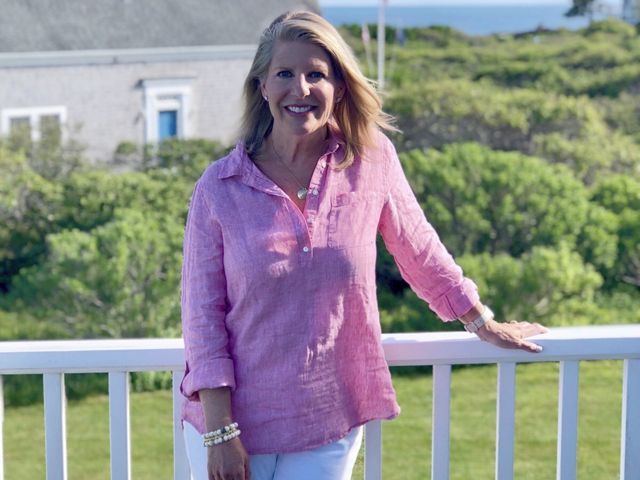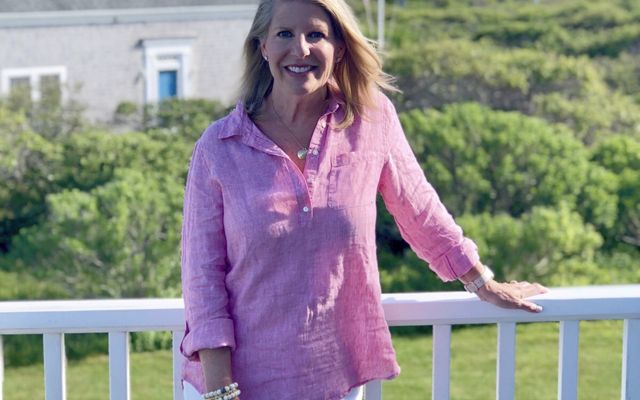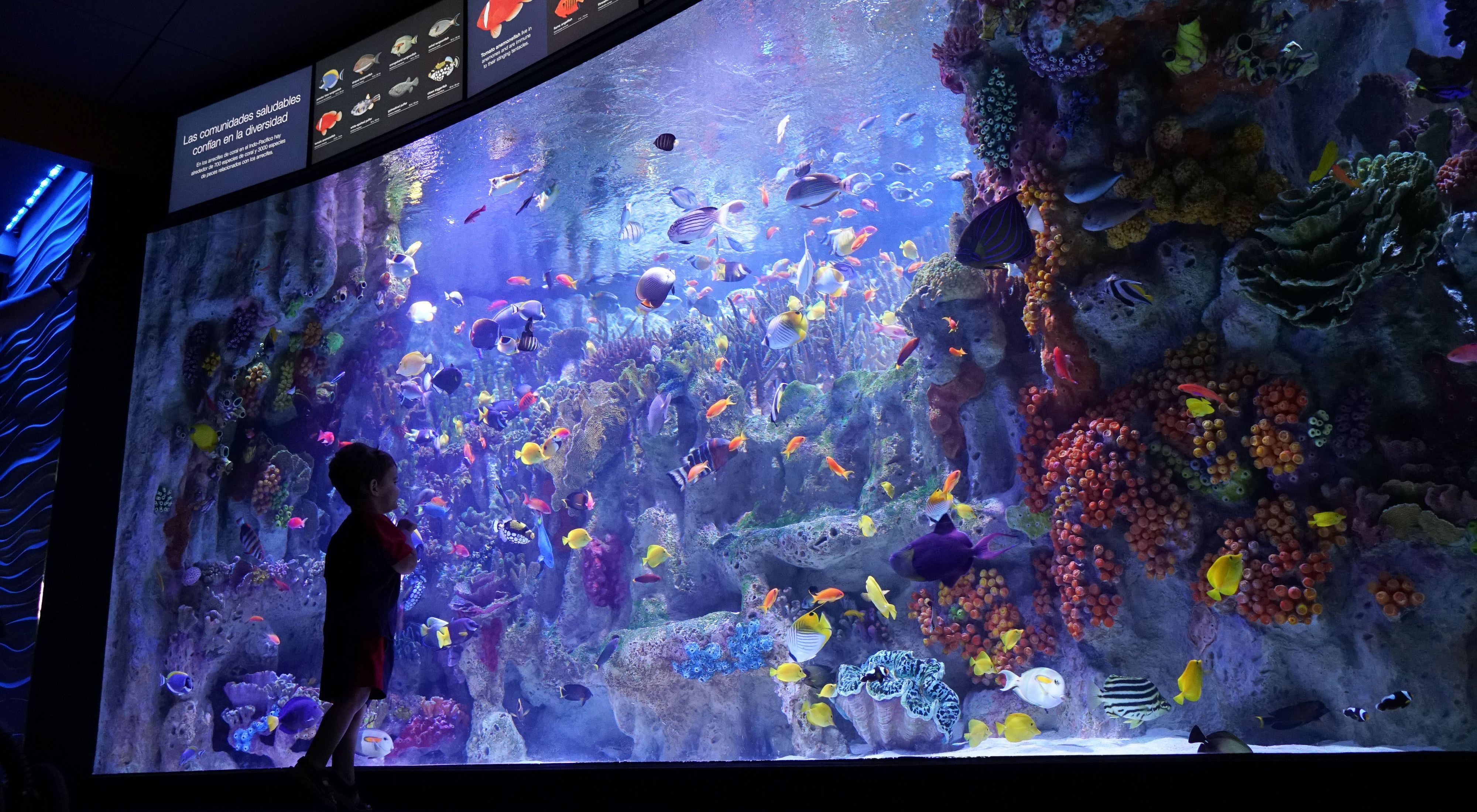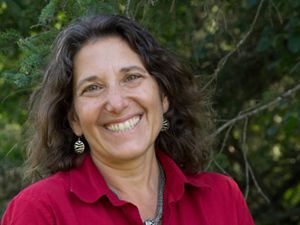A Conversation on Ocean Protection with Vikki Spruill
The New England Aquarium’s president and CEO loves the ocean and believes we can protect it from the threats of climate change and biodiversity loss.
You’ve just entered your third year as president and CEO of the New England Aquarium. What has surprised you most since you arrived?
Most people think of us primarily as an aquarium, but there’s a lot more to this institution than meets the eye. The Anderson Cabot Center for Ocean Life is the research arm of the Aquarium. Our scientists find practical, science-based solutions to mitigate human impacts on our ocean, often in partnership with universities, other non-governmental organizations, and industries such as fishing and offshore wind. Our research program on the endangered North Atlantic right whale is one of the longest-running and most comprehensive whale research and conservation initiatives in the world. We also have an Animal Care Center in Quincy, Massachusetts, where we rehabilitate endangered and threatened sea turtles, culture fish for our exhibits rather than collecting them from the wild, and grow much of our own food to feed our animals.

Have the ocean and marine life always been of interest to you?
I grew up living all over the world. When my father retired, we moved to the Gulf Coast and that’s where I really fell in love with the ocean. In high school, I shared with my science teacher and mentor that I planned to be a marine biologist. He told me there was no place for women in the sciences. I pursued a liberal arts path, though eventually found my way back to the ocean, where my communications skills have helped shape my career leading a variety of NGOs and other science communication efforts. It all comes full circle! I am also happy to report that more than half of the scientists in our Anderson Cabot Center are women.
Boston is inextricably connected to the ocean. Does that influence how the Aquarium fulfills its mission?
For almost as long as the Aquarium has been open—50 years—we’ve been driving and scaling conservation-centric solutions to the various threats facing the Gulf of Maine. It is warming at a faster rate than 99 percent of all bodies of water globally, and we’ve seen major ecological impacts and a potential threat to biodiversity as a result. We pioneered some of our early conservation efforts in the Gulf of Maine and today track the habitat use and movement of endangered sea turtle species, certain shark species, and, of course, the North Atlantic right whale.
What do you see as the Aquarium’s role in the public discourse about climate change?
All of the ocean animals and habitats we study are being affected by climate change, whether it’s an iconic New England fishery species like cod, the critically endangered North Atlantic right whale, or the sea turtles we rehabilitate. That’s why it’s so important to be doing fundamental research at the Aquarium and in our Anderson Cabot Center to understand what’s happening. We also want to spread the word far and wide about the need to address climate change and the simple ways people can help. We do that both in the Aquarium—which has more than 1.3 million annual visitors—and by providing a national network of aquariums, zoos and other science education centers working to address climate change with tools and resources to communicate about the issues in a way that empowers their audiences to be civic-minded and solutions-focused.
Quote: Vikki Spruill

All of the ocean animals and habitats we study are being affected by climate change. That’s why it’s so important to be doing fundamental research at the Aquarium and in our Anderson Cabot Center to understand what’s happening.
With regard to climate change impacts, what are people who work with marine environments every day seeing that the rest of us might not?
Everything we work on is impacted by climate change. The ocean is becoming warmer and more acidic, affecting ocean life and sea level rise. Given our location on Boston’s Central Wharf, we are seeing more frequent storm surges and flooding. We also sit on Massachusetts’ Commission on Ocean Acidification, alongside The Nature Conservancy, and are learning how shellfish are being impacted, which ultimately means lobstermen’s livelihoods may be at risk. While we’re studying the effects of warming oceans on animals, we’re also exploring blue technology innovations as a way to mitigate the effects of climate change while encouraging sustainable ocean use. We’re working with offshore wind companies, for example, and recently announced the New England Aquarium SeaAhead Venture Fellows Program with benefit corporation SeaAhead, Inc., a blue-tech startup platform, to foster early stage, sustainable blue-tech ocean projects.
How can organizations like the New England Aquarium and The Nature Conservancy work together?
We share a common goal of inspiring and motivating people to take action to protect our planet. We know the challenges facing the earth and the ocean are too big and complex for any of us to handle alone—we need to be collaborating and working together. Just as TNC works through chapters and programs around the world, we have a wide network to try to scale solutions from a local to a global level to solve ocean challenges. 20 years ago, we established the Marine Conservation Action Fund to provide funding and other forms of sustained support to emerging ocean leaders in developing countries. We share our science and learn about the methods and traditions these conservationists employ—all in the name of protecting vulnerable ecosystems.
Quote: Vikki Spruill
Humans caused climate change, so that means we can fix it. We can and we will.
You’ve talked about the importance of educating and inspiring others to be ocean advocates. Why do you feel this is central to the Aquarium’s work moving forward?
Our mission is to make people aware of the challenges facing the ocean, help them understand how it’s relevant to their lives, and then activate them to protect our blue planet. When they see and understand that the ocean plays an active part in their lives, they are more likely to make choices and take actions that impact the health of our oceans. Educating and inspiring others is how we do this, drawing upon all aspects of our institution—our animals, our science, our education. We’ve had some great successes in this work. Through a recent onsite postcard-writing campaign to members of Congress, visitors advocated for robust, science-based fisheries management policies and the protection of North Atlantic right whales. Our scientists also lead educational briefings for state legislators and their staff to raise awareness about ocean conservation and offer the Aquarium as a resource.
You’re the CEO of a major institution—that’s a demanding role with a lot of responsibility. What do you do to relax and keep balance in your life?
I stay connected to the things that inspire me: my family and the ocean. Both of my children work in conservation, so we’re all working toward the same goals—it’s a little bit of a family business, you could say. And we all love the beach. It’s always been the place where we unwind and refresh.
Is there one thing you hope readers take away from this conversation?
90 percent of excess heat caused by burning fossil fuels is absorbed by the ocean. We need to reorient our thinking about the importance of the ocean in conservation work on earth. Humans caused climate change, so that means we can fix it. We can and we will.



